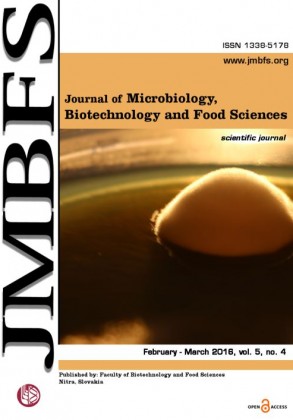EFFECT OF THE SINGLE DOSES OF CURCUMIN AND KAINIC ACID ON CHANGES IN THE AMOUNT OF REDUCED GLUTATHIONE IN SELECTED ORGANS OF MICE
DOI:
https://doi.org/10.15414/jmbfs.2016.5.4.341-344Keywords:
Curcumin, kainic acid, mouse, reduced glutathioneAbstract
In the present study the effect of various doses administration of curcumin prior to the injection of kainic acid (KA) on the changes in the content of reduced glutathione (GSH) in selected organs of the male white mice were investigated. Animals were conducted in five groups: one control group, four experimental groups. The first experimental group received a single intraperitoneal injection of KA (12 mg/kg b. w.). The second, third and the fourth experimental group were administered intraperitoneally curcumin at doses of 50, 100 and 200 mg/kg b. w. 30 minutes before the injection of KA. In the brain, liver, kidneys, pancreas and spleen of the mice GSH was determined. Administration of KA resulted in a significant change in the amount of GSH in all the examined organs of mice. Injections of curcumin and then KA, caused an increase in GSH compared to a group of animals which received only KA. This increase was not significant only in the group which received curcumin in the lowest dose. Results suggest that curcumin has antioxidant properties because advantageously affected changes in the amount of GSH, and thus the size of the oxidative stress induced by KA.Downloads
Download data is not yet available.
Downloads
Published
2016-02-01
How to Cite
Szaroma, W., Lach, H., Dziubek, K., & Goc, Z. (2016). EFFECT OF THE SINGLE DOSES OF CURCUMIN AND KAINIC ACID ON CHANGES IN THE AMOUNT OF REDUCED GLUTATHIONE IN SELECTED ORGANS OF MICE. Journal of Microbiology, Biotechnology and Food Sciences, 5(4), 341–344. https://doi.org/10.15414/jmbfs.2016.5.4.341-344
Issue
Section
Biotechnology
License
Copyright (c) 2016 Waldemar Szaroma, Henryk Lach, Karol Dziubek, Zofia Goc

This work is licensed under a Creative Commons Attribution 4.0 International License.
All papers published in the Journal of Microbiology, Biotechnology and Food Sciences are published under a CC-BY licence (CC-BY 4.0). Published materials can be shared (copy and redistribute the material in any medium or format) and adapted (remix, transform, and build upon the material for any purpose, even commercially) with specifying the author(s).





